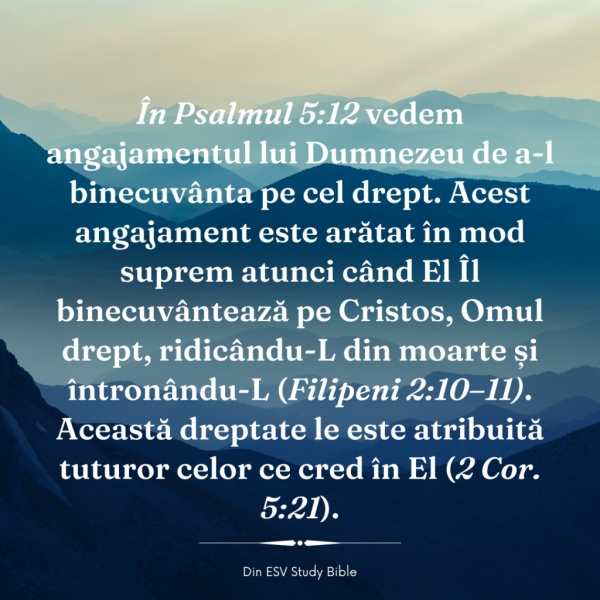
VLOG
INTERPETĂRI MUZICALE
PARTITURI
NEGATIV
PARTIRUI ȘI NEGATIV ÎN ENGLEZĂ LA PSALMUL 5 DIN PSALTIREA: PSALMS FOR THE CHURCH
Vezi: www.gracemusic.us/psalter
ISUS ÎN PSALMUL 5
PREDICI

Ascută aici:. www.stag.org/sermons/the-prayer-god-answers

COMENTARII
PSALM 5 - DE ANDREW BONAR
1–12 ANOTHER song of the sweet singer of Israel, handed over to the "Chief Musician," who was to fit it to be publicly sung "on the Nehiloth." This was some one of the many musical instruments now unknown, lost to us ever since Israel hung their harp on the willows, and had their joy turned into mourning*—though generally understood to be a wind instrument, or pipe, of some sort.
There is in it a prophetic element toward the close. In ver. 10, 11, we have something that closely resembles the Apocalyptic scene in Revelation 19:1, 3, 4, The psalmist so fully sympathises in the justice of the doom that is coming on the obstinate and impenitent rebels against God, that he cries aloud, "Destroy them, O God!" or, more exactly, "Hold them guilty, and treat them as such." On the other hand, there arises at the same moment the shout of the righteous, acquiescing with entire satisfaction in their doom: "And let all those that put their trust in thee, rejoice! Let them ever shout for joy!" This is their "Halelujah" over the rising smoke of torment—their "Glory and honour to the Lord our God." And perhaps it is in this manner we are to understand, throughout the Book of Psalms, all those portions where we find, apparently, prayers that breathe revenge. They are never to be thought of as anything else than the breathed assent of righteous souls to the justice of their God, who taketh vengeance on sin. When taken as the words of Christ himself, they are no other than an echo of the Intercessor's acquiescence at last in the sentence on the barren fig-tree. It is as if he cried aloud, "Hew it down now—I will intercede no longer—the doom is righteous, destroy them, O God; cast them out in (or, for) the multitude of their transgressions! for they have rebelled against thee."
And in the same moment he may be supposed to invite his saints to sympathize in his decision; just as in Revelation 18:20: "Rejoice over her, thou heaven, and ye holy apostles and prophets!" In like manner, when one of Christ's members, in entire sympathy with his head, views the barren fig-tree from the same point of observation, and sees the glory of God concerned in inflicting the blow, he too can cry, "Let the axe smite!" Had Abraham stood beside the angel who destroyed Sodom, and seen how Jehovah's name required the ruin of these impenitent rebels, he would have cried out, "Let the shower descend—let the fire and brimstone come down!" not in any spirit of revenge—not from want of tender love to souls—but from intense earnestness of concern for the glory of his God. We consider this explanation to be the real key that opens all the difficult passages in this book, where curses seem to be called for on the head of the ungodly.
They are no more than a carrying out of Deut. 27:15–26,—"Let all the people say, Amen," and an entering into the Lord's holy abhorrence of sin and delight in acts of justice expressed in the "Amen, hallelujah," of Rev. 19:3.* But let us read the whole Psalm. And we may notice that here the words occur, for the first time, "My King and my God." On this Augustine remarks, "Recte primo 'Rex meus,' et deinde Deus meus,' secundum illud quod dictum est, 'Per me itur ad Patrem.' " He that is peculiarly "King" to Israel is on Israel's side, for 1 Sam. 8:20 shews that the idea included in this term is fighting for his subjects. The blue, (Exod. 8:15), purple, and scarlet, at the gate of the Tabernacle, and on all its veils, proclaimed, "This is the dwelling of Israel's King, as well as Israel's God." We seem to see One going up to the Tabernacle early, in prospect of the morning sacrifice.
It is near the time; the priest is already at the altar, setting the wood in order, and the Lamb is bound to the altar's horns; the worshipper's eye and heart are upward,—"Give ear to my words, O Lord, consider my silent prayer" (ver. 1), a prayer made up of the "unutterable groanings" (Rom. 8:26), and which can be heard, as well as presented, while he stands amid the crowd that are gathering in the courts. "My voice shalt thou hear in the morning" (ver. 3), is the expression of a resolution habitually to come before him early,—"My earliest cry shall always be to thee; in the morning will I direct my (spiritual) offering unto thee, and will look up to that house of prayer where stand the altar and the mercy-seat, and where God is revealed in grace." The altar presents "God reconciling the world unto himself, not imputing unto men their trespasses." Jehovah's look of love is there; his voice is love from its four horns; everything tells man of grace. He is up early, securing the best hour of the day, "like a diligent artificer," (Horne). But how careless are those around this worshipper; some coming up to the altar to lull their conscience asleep by the formality of a visit to the courts of God; others hurrying off to their earthly pursuits. This leads him to meditate before God on the "world lying in wickedness" (ver. 4–9), interposing his own resolute determination to be unlike that world (ver. 7) by the help of Jehovah (ver. 8). A "dwelling with God," which at the lowest means friendly intercourse, is what his righteous soul relishes and revels in the enjoyment of, and the want of this he reckons to be the misery of the ungodly. (Ver. 4)
This is the very spirit of the beloved John (1 John. 4:16),—"He that dwelleth in love, dwelleth in God, and God in him;" and the resemblance is all the closer when we find ver. 7 speak of his coming "in the multitude of thy mercy," or "greatness of thy love," to worship in Jehovah's "Holy Temple." And then the believer's soul prays to be led by the pillar cloud of divine wisdom, knowing the snares of his foes. It is after this that he is brought into such deep sympathy with the holy purposes and righteous sentences of Jehovah, in whose love he dwells, as to cry, "Destroy them, O God," (ver. 10). And we leave him singing with assured confidence, "For thou, O Lord, wilt bless the righteous; with favour thou wilt compass him, as with a shield."
It is a Psalm which most certainly Messiah could use; none could ever use it so fully as He. Think of Him, some morning leaving Bethany early that He may be in time for the morning sacrifice, and breathing forth this Psalm by the way and as He enters the Templecourts. Every word of it becomes doubly emphatic in his lips, down to the last verse, where we see Him as "The Righteous One," encompassed with the Father's love and well-pleasedness. But whether we read it as peculiarly the utterance of Messiah, or as that of one of his members, we may describe this Psalm as being The Righteous One's thoughts of God and of man while going up to the morning sacrifice.
COMENTARIU DE SPURGEON










